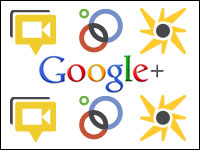
Who’s the most popular person on Google’s spanking new social networking site? Britney? Lady Gaga? Larry or Sergey? Nope, it’s Facebook CEO Mark Zuckerberg. He has racked up a whopping 29,543 followers on Google+ as of Tuesday, beating out Google cofounders Larry Page — who came in second with 19,878 — and Sergey Brin, who took fourth place with 15,646.
Many wondered if it was actually Zuckerberg. His identity was confirmed by tech blogger Robert Scoble via Twitter, who noted Zuckerberg texted him saying, “Why are people so surprised that I’d have a Google account?”
It’s not surprising that Zuckerberg would be popular — he was Time’s 2010 Person of the Year after all — but it’s ironic that he would take the top spot at a competitor’s site.
Google+ is an awful lot like Facebook. While it’s obvious why people would be connected to both LinkedIn (for business) and Facebook (friends and family), it’s not clear why people would go to the trouble of using both Facebook and Google+.
Google has tried to downplay direct comparisons between Google+ and Facebook, focusing instead on the distinctions between the two.
“The Google+ project is our attempt to make online sharing even better,” spokesperson Katie Watson told TechNewsWorld. “We aren’t trying to replace what’s currently available — we just want to introduce a new way to connect online with the people who matter to you.”
Facebook did not respond to the E-Commerce Times’ request for comments by press time.
Room for 2 Giants?
With Facebook now claiming well over half a billion users, who needs Google+? Is it overkill to have two major general-interest social networking options?
“I think that there is room for other social networking solutions, but they must be differentiated and offer something for specific segments,” Jim McGregor, chief technology strategist at In-Stat, told TechNewsWorld.
“I know many people who have stopped using Facebook because of privacy concerns,” he said. “If an alternative were offered that addressed those issues, I think it would generate a great deal of interest. However, I don’t know that Google+ is differentiated enough, yet.”
The privacy issue is no small matter. Everyone has friends or relatives who have thrown up their hands in utter frustration with Facebook, exiting in a huff.
“One way to think of Google+ is social networking for those who don’t like Facebook — just as Android is an iPhone for people who don’t like Apple,” Carl Howe, director of anywhere consumer research at the Yankee Group, told TechNewsWorld.
“There’s a big market there,” he observed. “After all, Facebook subscriptions in the United States are now declining, which indicates that Facebook has saturated the market for those who can tolerate its approach.”
Google+ may offer a number of improvements over Facebook. Its handling of privacy is the big one, but there are numerous others, such as connectivity with other Google tools.
“What Google+ offers is a more streamlined Facebook experience that’s integrated well with current Google functions,” Steven Savage, technology project manager and Geek 2.0 blogger, told TechNewsWorld.
“Facebook, for all it offers, is actually rather ‘noisy’ when one gets down to it,” he noted, “with many options, groups, and features that have just ballooned over the years. All those features are good if you want to use Facebook as a central social media area — what Google offers is an alternative that ties into services you may use.”
One general social site may not be enough for consumers who have a tendency to dislike monopolies.
“People like some competition,” said Savage. “In the end, people will use both, but how much they use each is the question. Eventually people will pick a favorite platform and use the other as needed. There will probably be, at some point, some sharing of information so everyone can make their customers happy.
As big as Facebook is, it will difficult for Google+ to make inroads. Facebook has grown in part because people find their friends there.
“This isn’t going to kill Facebook at all — Facebook knows what it’s doing and has been doing it for awhile,” said Savage. “It is going to add competition, require them to rethink some strategies, and give them pause.”
New Hope for MySpace?
If Facebook and Google+ are the two general social networking sites, where does that leave MySpace? If there are questions about whether there is room for two big sites, could there possibly be room for three or even four?
“With Google+ taking on Facebook, I wonder if it will actually open up interest in a third player in social media space, or other specialist players,” said Savage. “With Google+ and Facebook slugging it out with different strategies and goals, the opportunity may be there. Imagine an expanded LinkedIn going even more social — that would appeal to professionals who spend most of their time on LinkedIn. Imagine what app makers could do with so many useful APIs.”
MySpace has been looking more than a bit ragged around the edges, but News Corp. just sold it at a considerably discounted price. Possibly its new owners can revivify the once-dominant network?
“I’m skeptical that Myspace will succeed, but that skepticism is because its brand has been tarnished by News Corp.’s neglect over the years,” said Howe. “But I think there’s plenty of room for Facebook, Google+, and LinkedIn and many more to compete for social networking users.”





















































Great article today on hubski.com about why Google+ could be the beginning of the end for google. Definitely worth a quick read. I’ll provide the link below:
http://hubski.com/pub?id=2069